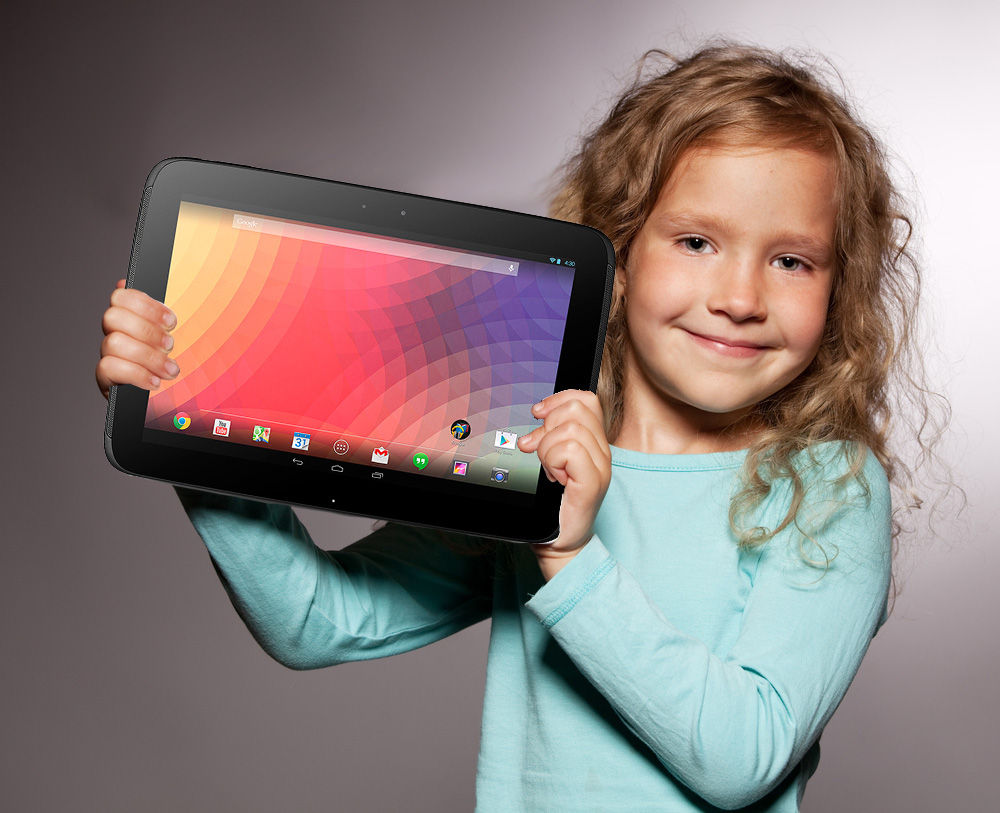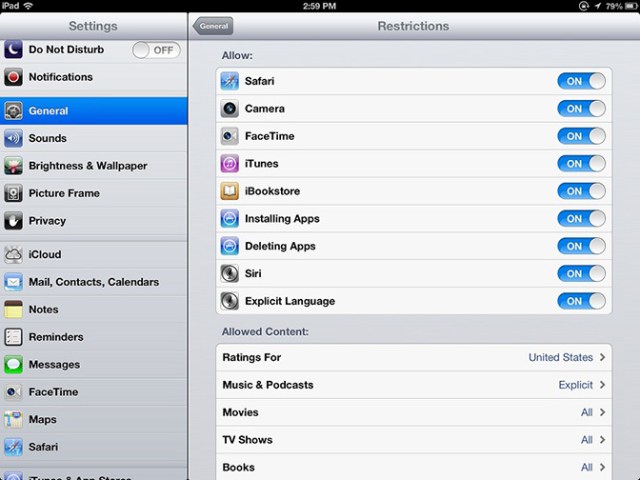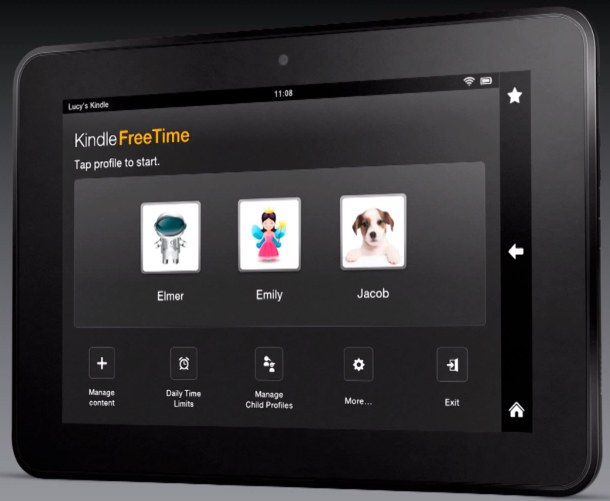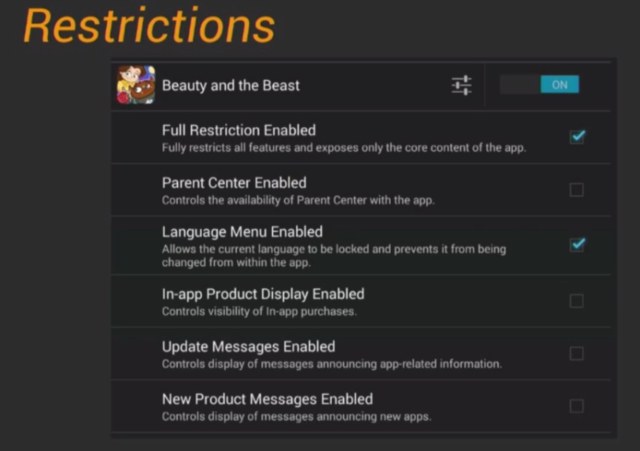With the release of the newest version of Google’s Android operating system (version 4.3, still known as Jelly Bean), the company is making Android tablet computers, like its own Nexus 10 and newly announced Nexus 7, more appealing to parents. Android 4.3 includes a new feature called “Restricted Profiles,” which, more simply put, is the introduction of a “kid’s mode” for Android.
The move to implement parental controls comes at a time when Apple’s iPad has claimed the leading position in the tablet market it helped to forge, attracting the majority of developer interest and revenue when it comes to applications designed for children, and otherwise.
But as these computers find their way into the hands of ever-younger children, Apple’s lack of more intelligent, granular controls has become an increasingly common problem for parents who want to provide a safer experience for their children. This is the area Google is now trying to attack.
Android Takes On Apple’s “Restrictions,” Kindle FreeTime
Apple’s iOS operating system has long since included restrictions, but these have been largely limited to global on/off switches that let children either access core Apple features, like iTunes or Safari, or not. They can also prevent kids from deleting or installing apps, downloading apps and music of a certain rating, or accessing in-app purchases, among other things.
However, the issue with parental controls based on ratings alone is that they can end up hiding apps parents approve of, to a point. Netflix, for example, which already has its own “Just for Kids” section (though not yet user profiles of its own), makes it an app some parents may want to permit for younger children, but couldn’t if opting for parental controls, due to Netflix’s “12+” age rating.
Then there are other cases where the parent is fine with the app’s content itself, but needs to restrict the in-app purchase mechanism. This too, seems like a fine idea, until the kid returns to you time and again asking you to please, please, please let them buy virtual goods or power-ups, or whatever else the app developer is pushing in their desperate attempt to eke out some pocket change in an ecosystem that’s rapidly adopting the free-to-play business model.
The problem with Apple’s controls to date has led some users to implement some creative solutions. For example, when I previously called out Apple’s need for a “kid mode,” commenters railed that I hadn’t considered “Guided Access” as an option. For those unfamiliar, Guided Access is akin to a kiosk mode, which limits the device to running a single app and lets you disable select areas of the screen. While you can hack this into a one-off solution for an app, to pretend it’s a kid mode is quite a stretch. Children capable of using an iPad on their own — which is generally possible before they’re even out of diapers — want to move from app to app, and Guided Access requires a parent’s constant attention as kids’ short attention spans waver. After all, if you’re planning to sit with the child the entire time they’re using the tablet, you hardly need a parental control solution — because that’s you. Parental controls are meant to stand in for the parent when they’re not nearby.
Apple, relying on its position as the tablet market leader, has forced others like Amazon with its Kindle Fire to compete on feature set, including parental controls. With its “Kindle FreeTime” option, Amazon has been the one to beat in terms of smarter restrictions, with options for profiles, content whitelists, and even daily time limits. Now Google is upping the game yet again, with fine-grain controls in the core Android operating system.
How Android’s Restricted Profiles Work
The new addition of restricted profiles on Android 4.3 are interesting because of how granular the controls can become.
Google explains that parents will now be able to essentially whitelist the apps that will display under the child’s login (Android 4.3 had already introduced the concept of user profiles). But what’s more, parents will also now be able to drill down into various, customized settings within individual apps in order to be very specific about what sort of content their child can access. For example, the parent could restrict more general annoyances like the child’s ability to change the app’s language or attempt to enter the app’s own parental control panel.
You could also prevent the app from sending push messages about updates or new products, or prevent the app from accessing the child’s location. Most importantly, you can also control access to in-app purchases on a per-app level. And not only that, but Android 4.3 can allow whether or not the in-app purchases even display within the application.
This all sounds like a parent’s dream come true. Or, at least, a geek parent who has been longing for advanced, technical controls of this nature. But there’s a catch. Developers will have to take advantage of Android 4.3’s restricted profile API in order to implement these fine-grain controls for parents, and it’s unclear what their advantage is for doing so.
But Wait! Developers Have To Opt In
As noted above, the app ecosystem is already seeing the number of paid apps decline, as users overwhelmed by choice are opting for free apps and games that choose to monetize through ads or in-app purchases. And Android app developers are struggling to generate revenue in comparison to those on iPhone or iPad, with an average app price of just 6 cents to iPhone’s 19 cents and iPad’s 50 cents, for instance. Why would they rush to implement a control that would then directly cut into their ability to make a profit? It may not be right to pitch in-app content to susceptible children, but this is exactly what some of the top app makers are doing.
Plus, there’s the larger problem of children’s app makers building for iOS first, in search of revenue and user adoption. This is true whether smaller startups or big-name kid’s brands like Nick or Disney (and more). The kid’s content just isn’t there yet, and many of the apps that do exist aren’t up to the quality of the iOS selection.
For many reasons, those in the business of providing parental control and “kid mode” software of their own to Android owners don’t currently see the Android implementation a threat to their companies. “This might be a threat for simple parental controls apps, for KIDO’Z this is not,” says CEO of the kid mode app KIDO’Z, whose software is preloaded on over 20 low-end Android tablets aimed at kids.
Anooj Shah, co-founder of parental control software Kytephone, agrees. “The user profiles won’t affect parental control providers as they offer a larger feature set,” he says. “User profiles offered by Google are perfect for casual use when sharing tablets among a family, rather than ensuring the tablets are used responsibly by the kids.”
So for parents, the larger takeaway for now is that there are still many trade-offs when it comes to making the “family tablet” purchase. Ultimately, this addition is a boon to those who were considering (a non-Kindle) Android tablet anyway. But it won’t mean you no longer need additional parental control software, and based on its merits alone, it probably won’t drive parents to choose or switch from iPad.


































Comment